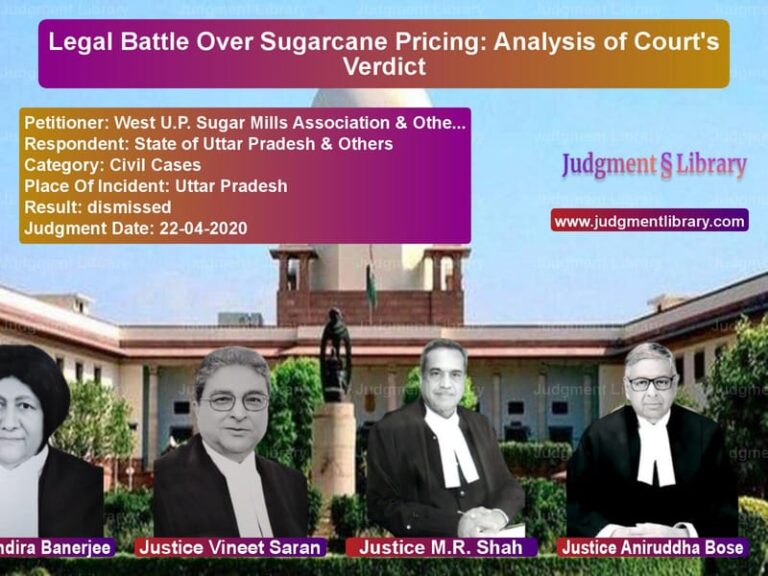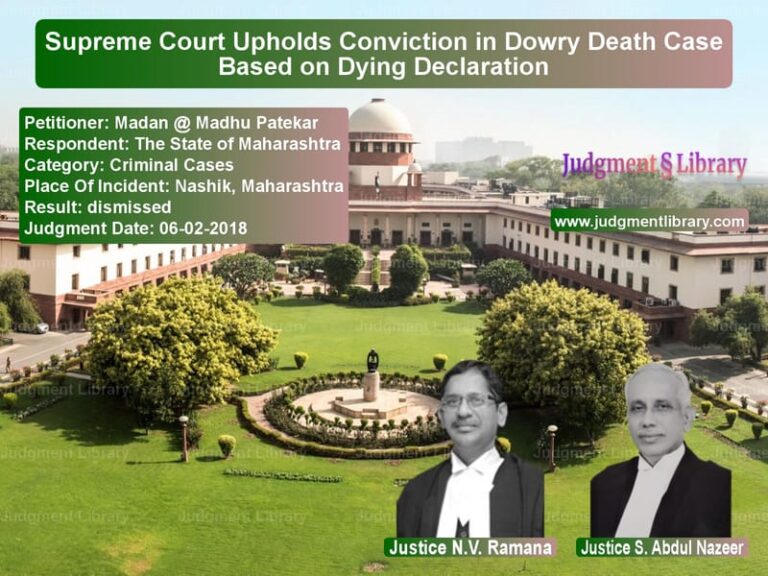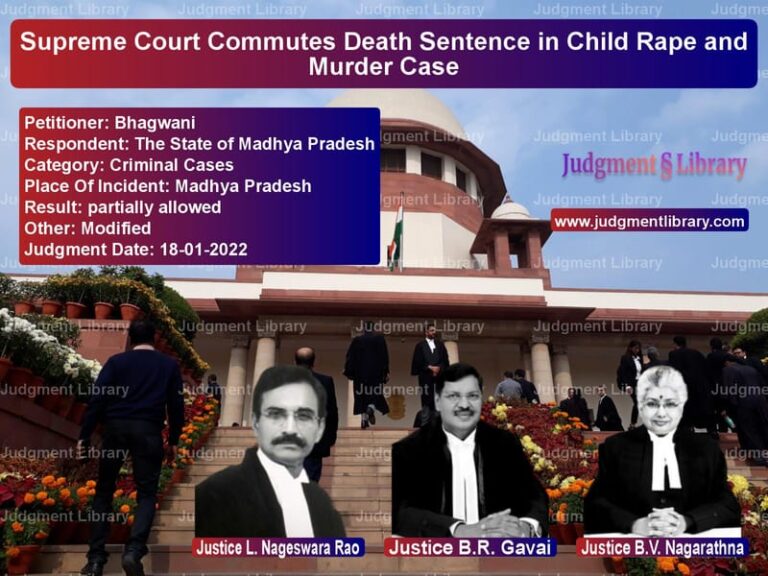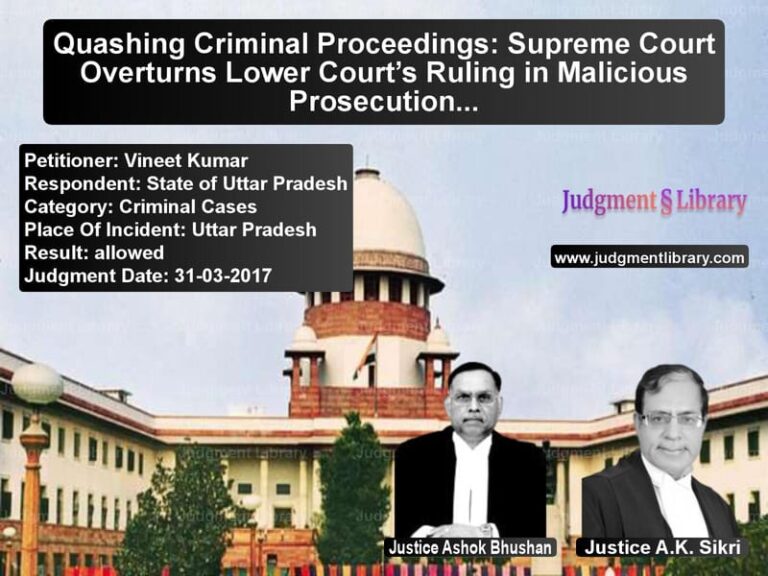Supreme Court Restores Appeal in Rape Conviction Case After Procedural Lapses
The Supreme Court of India recently delivered a significant judgment in the case of Sanjit Saha & Anr. vs. The State of West Bengal. This case dealt with the procedural lapses in handling appeals and the right of an accused to be heard. The judgment touches upon fundamental rights under Article 21 of the Constitution of India, emphasizing the importance of procedural fairness in criminal trials.
Background of the Case
The petitioners, Sanjit Saha and Anil Saha, were convicted under Section 376(2)(g) of the Indian Penal Code and sentenced to 10 years of rigorous imprisonment along with a fine of ₹20,000 each. Their conviction was upheld by the Calcutta High Court in its judgment dated July 5, 2018. The petitioners then approached the Supreme Court, challenging their conviction and sentence.
A crucial issue arose when their Special Leave Petition (SLP) was dismissed due to failure to file proof of surrender. The case highlights the procedural gaps in ensuring fair representation and the role of legal aid in criminal cases.
Key Legal Issues Before the Supreme Court
The Supreme Court examined the case on the following grounds:
- Whether the dismissal of the SLP due to non-filing of surrender proof was justified.
- Whether the petitioners’ right to appeal under Article 136 of the Constitution was violated due to procedural lapses.
- Whether the Supreme Court should restore the appeal to ensure justice.
Arguments by the Petitioner
The petitioners argued that:
- They had surrendered before the trial court as required by law.
- Their failure to file surrender proof was due to a miscommunication between their legal representatives and the Supreme Court registry.
- The dismissal of their appeal on technical grounds deprived them of their constitutional right to seek justice.
- The High Court had erred in convicting them based on insufficient evidence.
Arguments by the Respondent (State of West Bengal)
The State argued that:
- The petitioners failed to comply with the Supreme Court’s order to furnish proof of surrender.
- There was no procedural irregularity, and the petitioners’ failure to comply led to the dismissal of their appeal.
- The conviction was based on strong evidence, and there was no need for further review.
Supreme Court’s Key Observations
The Supreme Court closely analyzed the procedural issues and ruled in favor of restoring the appeal for further hearing. The key observations included:
1. Failure to Report Compliance Cannot Prejudice the Accused
The Court noted that the dismissal of the appeal was due to the non-filing of surrender proof, not the petitioners’ failure to surrender. The judgment stated:
“The accused had surrendered as per the court’s order. Their appeal should not be dismissed due to procedural lapses in reporting compliance.”
2. The Role of Legal Aid in Criminal Cases
The Court highlighted the importance of legal representation and fair trial rights. It observed:
“The right to appeal is a fundamental aspect of the criminal justice system. The absence of legal representation should not deprive an accused of their right to seek justice.”
3. High Courts Must Ensure Procedural Fairness
The judgment emphasized that procedural fairness is integral to justice and that courts must ensure compliance without unfairly penalizing the accused:
“Where procedural gaps occur due to circumstances beyond the accused’s control, the Court must intervene to prevent a miscarriage of justice.”
Final Judgment
Based on these findings, the Supreme Court ruled:
- The dismissal of the SLP was set aside.
- The appeal was restored for hearing on merits.
- The case was remanded to ensure that the petitioners received a fair hearing.
Implications of the Judgment
This ruling has significant legal implications:
- Strengthening Access to Justice: Courts must ensure procedural compliance without unfairly prejudicing the accused.
- Ensuring Fair Trial Rights: The judgment reinforces that legal representation is crucial in criminal appeals.
- Guidance on Procedural Lapses: Courts should adopt a pragmatic approach to avoid technical dismissals.
Conclusion
The Supreme Court’s decision in Sanjit Saha & Anr. vs. The State of West Bengal reaffirms the importance of procedural fairness in criminal appeals. The ruling ensures that an accused’s right to appeal is not curtailed due to legal miscommunication or procedural lapses. This judgment serves as an essential precedent for ensuring access to justice in the Indian legal system.
Petitioner Name: Sanjit Saha & Anr..Respondent Name: The State of West Bengal.Judgment By: Justice K.V. Viswanathan.Place Of Incident: West Bengal.Judgment Date: 09-10-2023.
Don’t miss out on the full details! Download the complete judgment in PDF format below and gain valuable insights instantly!
Download Judgment: sanjit-saha-&-anr.-vs-the-state-of-west-be-supreme-court-of-india-judgment-dated-09-10-2023.pdf
Directly Download Judgment: Directly download this Judgment
See all petitions in Bail and Anticipatory Bail
See all petitions in Custodial Deaths and Police Misconduct
See all petitions in Judgment by K.V. Viswanathan
See all petitions in allowed
See all petitions in Remanded
See all petitions in supreme court of India judgments October 2023
See all petitions in 2023 judgments
See all posts in Criminal Cases Category
See all allowed petitions in Criminal Cases Category
See all Dismissed petitions in Criminal Cases Category
See all partially allowed petitions in Criminal Cases Category







